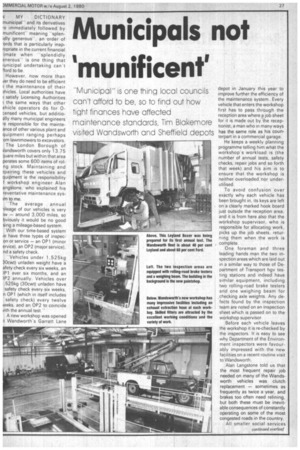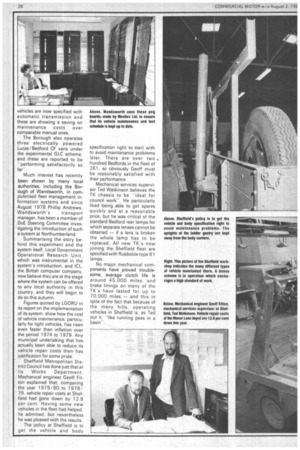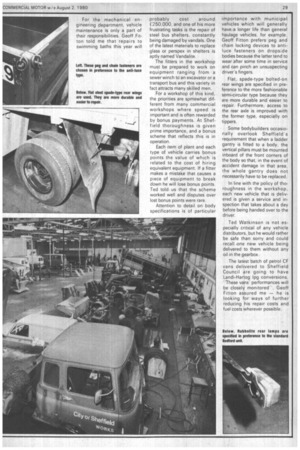Municipals not
Page 29

Page 30

Page 31

If you've noticed an error in this article please click here to report it so we can fix it.
'munificent
"Municipal" is one thing local councils can't afford to be, so to find out how tight finances have affected maintenance standards, Tim Blakemore visited Wandsworth and Sheffield depots
MY DICTIONARY
municipaland its derivatives
re immediately followed by
munificent" meaning -splenidly generous-, an order of ,ords that is particularly inap
ropriate in the current financial !imate when "splendidly enerous" is one thing that iunicipal undertaking can't fford to be.
However, now more than ver they do need to be efficient
the maintenance of their .1-itcles. Local authorities have
satisfy Licensing Authorities
the same ways that other ehicle operators do for 0censed vehicles, but additioally many municipal engineers re responsible for the mainteance of other various plant and quipment ranging perhaps .om lawnmowers to excavators.
The London Borough of .(andsworth covers only 13.75 quare miles but within that area perates some 600 items of rolng stock. Maintaining and .pairing these vehicles and quipment is the responsibility f workshop engineer Alan angstone. who explained his reventative maintenance sysKn to me.
"The average annual iileage of our vehicles is very AA/ — around 3,000 miles, so bviously it would be no good sing a mileage-based system.
With our time-based system ie have three types of inspecon or service — an OP1 (minor ervice), an 0P2 (major service), nd a safety check.
"Vehicles under 1,525kg 30cwt) unladen weight have a afety check every six weeks, an )P1 ever six months, and an )P2 annually. Vehicles over 525kg (30cwt) unladen have safety check every six weeks. n OP1 (which in itself includes safety check) every twelve weeks, and an 0P2 to coincide vith the annual test."
A new workshop was opened Wandworth's Garratt Lane depot in January this year to improve further the efficiency of the maintenance system. Every vehicle that enters the workshop first has to pass through the reception area where a job sheet for it is made out by the receptionist, a man who in many ways has the same role as his counterpart in a commercial garage.
He keeps a weekly planning programme telling him what the workshop's workload is (the number of annual tests, safety checks, repair jobs and so forth that week) and his aim is to ensure that the workshop is neither overloaded nor underutilised.
To avoid confusion over exactly why each vehicle has been brought in, its keys are left on a clearly marked hook board just outside the reception area, and it is from here also that the workshop supervisor, who is responsible for allocating work, picks up the job sheets, returning them when the work is complete.
One foreman and three leading hands man the two inspection areas which are laid out in a similar way to those of Department of Transport hgv testing stations and indeed have similar equipment, including two rolling-road brake testers and one weighing beam for checking axle weights. Any defects found by the inspection team are noted on an inspection sheet which is passed on to the workshop supervisor.
Before each vehicle leaves the workshop it is re-checked by the inspectors_ It is easy to see why Department of the Environment inspectors were favour ably impressed with the new facilities on a recent routine visit to Wandsworth.
Alan Langstone told us that the most frequent repair job needed on many of the Wands worth vehicles was clutch replacement — sometimes as frequently as twice a year, and brakes too often need relining, but both these must be inevit able consequences of constantly operating on some of the most congested roads in the country.
All smaller social services vehicles are now specified with automatic transmission and these are showing a saving on maintenance costs over comparable manual ones.
The Borough also operates three electrically powered Lucas/Bedford CF vans under the experimental GLC scheme, and these are reported to be "performing satisfactorily so far".
Much interest has recently been shown by many local authorities, including the Borough of Wandsworth, in corn-. puterised fleet management information systems and since August 1978 Phillip Andrews, VVandsworth's transport manager, has been a member of DoE Steering Committee investigating the introduction of such a system at Northumberland.
Summarising the story behind this experiment and the system itself, Local Government Operational Research Unit, which was instrumental in the system's introduction, and ICL, the British computer company, now believe they are at the stage where the system can be offered to any local authority in this country, and they will begin to do so this autumn.
Figures quoted by LGORU in its report on the implementation of its system, show how the cost of vehicle maintenance, particularly for light vehicles, has risen even faster than inflation over the period 1974 to 1979. Any municipal undertaking that has actually been able to reduce its vehicle repair costs then has justification for some pride.
Sheffield Metropolitan District Council has done just that at its Works Department. Mechanical engineer Geoff Fitton explained that, comparing the year 1979 / 80 to 1978/ 79, vehicle repair costs at Sheffield had gone down by 12.8 per cent. Having some new vehicles in the fleet had helped, he admitted, but nevertheless he was pleased with the results.
The policy at Sheffield is to get the vehicle and body specification right to start with to avoid maintenance problems later. There are over two hundred Bedfords in the fleet of 261, so obviously Geoff must be reasonably satisfied with their performance.
Mechanical services supervisor Ted Watkinson believes the TK chassis to be "ideal for council work". He particularly liked being able to get spares quickly and at a reasonable price, but he was critical of the standard Bedford rear lamps for which separate lenses cannot be obtained — if a lens is broken the whole lamp has to be replaced. All new TK's now joining the Sheffield fleet are specified with Rubbolite type 61 lamps.
No major mechanical components have proved troublesome, average clutch life is around 45,000 miles, and brake linings on many of the TK's have lasted for up to 70,000 miles — and this in spite of the fact that because of the many hills, operating vehicles in Sheffield is, as Ted put it, "like running peas in a basin" For the mechanical engineering department, vehicle maintenance is only a part of their responsibilities. Geoff Fitton told me that repairs to swimming baths this year will probably cost around £250,000. and one of his more frustrating tasks is the repair of steel bus shelters, constantly being damaged by vandals. One of the latest materials to replace glass or perspex in shelters is aptly named Vandalite.
The fitters in the workshop must be prepared to work on equipment ranging from a sewer winch loan excavator or a transport bus and this variety in fact attracts many skilled men.
For a workshop of this kind, the priorities are spmewhat different from many commercial workshops where speed is important and is often rewarded by bonus payments. At Sheffield thoroughness is given prime importance, and a bonus scheme that reflects this is in operation.
Each item of plant and each type of vehicle carries bonus points the value of which is related to the cost of hiring equivalent equipment. If a fitter makes a mistake that causes a piece of equipment to break down he will lose bonus points. Ted told us that the scheme worked well and disputes over lost bonus points were rare.
Attention to detail on body specifications is of particular importance with municipal vehicles which will generally have a longer life than general haulage vehicles, for example. Geoff Fitton prefers peg and chain locking devices to antiluce fasteners on drops;de bodies because the latter tend to wear after some time in service and can pinch an unsuspecting driver's fingers.
Flat, spade-type bolted-on • rear wings are specified in preference to the more fashionable semi-circular type because they are more durable and easier to repair. Furthermore, access to the rear axle is improved with the former type, especially on tippers.
Some bodybuilders occasionally overlook Sheffield's requirement that when a ladder gantry is fitted to a body, the vertical pillars must be mounted inboard of the front corners of the body so that, in the event of accident damage in that area, the whole gantry does not necessarily have to be replaced.
In line with the policy of thoroughness in the workshop, each new vehicle that is delivered is given a service and inspection that takes about a day before being handed over to the driver, Ted VVatkinson is not especially critical of any vehicle distributors, but he would rather be safe than sorry and could recall .one new vehicle being delivered to them without any oil in the gearbox.
The latest batch of petrol CF vans delivered to Sheffield Council are going to have Landi-Hartog lpg conversions. 'These veils' performances will be closely monitored'', Geoff Fitton assured me — he is looking for ways of further reducing his repair costs and fuel costs wherever possible,




























































































